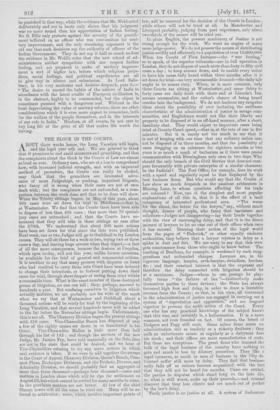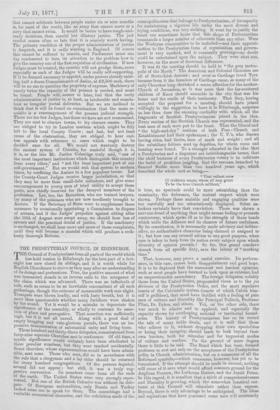THE BLOCK IN THE COURTS. A BOUT three weeks hence, the
Long Vacation will begin, and the legal year will end. We are grieved to think that it promises to end amid murmurs and grumbling, and that the complaints about the block in the Courts of Law are almost as loud as ever. Ordinary men, who are at a loss to comprehend how, with increased judicial strength, and with an improved method of procedure, the Courts can really be choked, may think that the grumblers are interested advo- cates of more Judgeships, or pushing, impatient litigants, who fancy all is wrong when their cases are not at once dealt with ; but the complaints are not unfounded, as a com- parison between the work done and that to be done will show. When the Trinity sittings began, in May of this year, about 900 cases were set down for trial in Middlesex,—that is, at Westminster. We find that the Courts there have been able to dispose of less than 400 cases ; that more than 70 special- jury cases are untouched ; and that the Courts have an- nounced that they will take in these sittings no case after the 370th. We understand that about 300 more actions have been set down for trial since the Hats were published. Next week, one or two Judges will go to Guildhall to try London causes. They will sit there for a week or two, trying two or three cases a day, and leaving huge arrears when they depart,—a fact of all the more consequence, because the Assizes at Croydon, which open to-day, will not this year, tmlike former occasions, be available for the trial of general and commercial actions. It is needless to say that many persons with disputes on hand who had resolved to carry them into Court have been induced to change their intentions, or to forbear putting down their cases for trial, through sheer despair of seeing them tried within a reasonable time. What is the exact number of these destroyed germs of litigation, no one can tell ; they, perhaps, amount to hundreds a year. But confining ourselves to litigation which actually matures, we are probably not far wide of the mark when we say that at Westminster and Guildhall about a thousand actions will be ready for trial by the beginning of the Long Vacation, and that several hundreds more will be added to the list before the November sittings begin. Unfortunately, this is not all. The Chancery Division began the present sittings with G10 cases. Vice-Chancellor Bacon has disposed of only a few of the eighty causes set down in or transferred to his Court. Vice-Chancellor Melina is little more than half through his list of 143 ; and though the services of the new Judge, Mr. Justice Fry, have told materially on the lists, they are not in the state that could be desired, and we hear of Vice-Chancellors refusing to try any more actions in which oral evidence is taken. If we were to add together the arrears in the Court of Appeal, Chancery Division, Queen's Bench, Com- mon Pleas, Exchequer Divisions, and the Probate, Divorce, and Admiralty Division, we should probably find an aggregate of more than three thousand—perhaps four thousand—cases and matters in London alone which will be ripe for settlement on August 10,but which cannot be settled for many months to come. In the provinees matters are not better. At few of the chief Circuit towns will all the cases be tried out. Many will be re- ferred to arbitration ; some, which involve important points of law, will be reserved for the decision of the Courts in London ; while others will not be tried at all. In Manchester and Liverpool probably, judging from past experience, only about two-thirds of the causes will be tried out.
In plain English, the present machinery of Justice is not strong enough for the work. We want an engine of many more judge-power. We do not possess the means of distributing justice swiftly and efficiently to a population of even 15,000,000. When ten Courts of First Instance—the "war footing," so to speak, of the superior tribunals—are in full operation in London, they do not dispose of much more than forty to fifty civil cases a day ; to keep arrears down, and to enable every suitor to have his cause fully heard within three months after it is set down for trial—no very unreasonable demand—the daily tale ought to be nearer sixty. When, as is more common, only three Courts are Bitting at Westminster, and some thirty to forty cases are daily dealt with there and at Lincoln's Inn, arrears accumulate, and the suitor's chance of being heard recedes into the background. We do not harbour any sanguine ideas about the possibility of ever imitating the swiftness characteristic of the administration of justice in savage com- munities, and Englishmen would not like their liberty and property to be disposed of in an off-hand manner, after a short, desultory chat. They would object to important cases being tried at County-Court speed,—that is, at the rate of one in five minutes. But it is surely not too much to say that it is out of keeping with our time that any ordinary action can- not be disposed of in three months, and that the possibility of cases dragging on an existence for eighteen months or two years is as much a mark of barbarism as if there were postal communication with Birmingham only once in two days. Why should the only branch of the Civil Service that does not com- pare favourably with private enterprise of a similar character be the Judicial ? The Post Office, for example, does its work with a speed and regularity equal to that displayed by the best business firms. But who would say that the Courts of Law show as much despatch as the amateur arbitrators in Mincing Lane, to whom questions affecting the tea trade are referred ? Now, one of the simplest and most popular explanations of all this is, that it is the effect of a tacit conspiracy of interested professional men. "The worse for the client, the better for the lawyer," say, without much thought, dozens of people, who fancy that barristers and solicitors—Judges not disapproving—lay their heads together with the view of encouraging delay, and that 'it is the direct interest of lawyers to let no case out of their offices when once it has entered. Drawing their notion of the legal world from the pages of "Pickwick," or other equally eminent authorities, they believe that a lawyer rejoices in delay as a spider in dust and dirt. We are sorry to say that this view gets countenance from those who ought to know better. The teaching of Bentham, for example, is weakened by such exag- gerations and unfounded charges. Lawyers are, in his vigorous language, harpies, arch-harpies, swindlers, leeches, &a. ; and their constant interest is that the expenses and therefore the delay connected with litigation should be at a maximum. Judges—whom in one passage he play- fully terms "the fathers of lies "—instinctively make themselves parties to these devices ; the State has always favoured high fees and delay, in order to draw a lucrative revenue from the Courts ; so that, in his view, all concerned in the administration of justice are engaged in carrying out a system of "depredation and oppression," and are leagued together to prevent the swift action of the Court. Every one who has any practical knowledge of the subject knows that this was, and certainly is, a hallucination. It is a mere romance, not even founded on fact. Of course, the breed of Dodgson and Fogg still exist, Some minor firms nurse an administration suit as tenderly as a ricketty firstborn ; they milk an unfortunate estate as regularly as a dairyman does his stock ; and their offices are mere manufactories of costs. But these are exceptions. The great firms who transact the bulk of the legal business of the country have nothing to gain and much to lose by dilatory procedure. They like a rapid turnover, as much as men of business in the City do. Counsel suffer still more by delay. They find that business sadly falls off as suitors become acquainted with the fact that they will not be heard for months. Cases are settled, the parties to disputes which stand long on the lists die, or, what is still worse, make up their quarrels,—and counsel discover that they lose clients and are much out of pocket by the law's delay. Tardy justice is no justice at all. A system of Judicature that cannot arbitrate between people under six or nine months is, for most of the world, like an army that cannot move or a navy that cannot swim. It would be better to have rough-and- ready decisions, than careful but dilatory justice. The just verdict comes often so late that it is scarcely worth having. The primary condition of the proper administration of justice is despatch, and it is sadly wanting in England. Of course this cannot be suffered to remain, and Parliament must one day condescend to turn its attention to the problem how to give the country one of the first requisites of civilisation. If new Judges must be created, the country will not grudge them, more especially as each of the Judges will be really self-supporting. If it be deemed necessary to appoint, under powers already exist- ing, half a dozen Commissioners of Assize, at £2,500 each, there will be no one to question the propriety of expense. Machinery of nearly twice the capacity of the present is needed, and must be found. People will, sooner or later, feel that the tardy administration of justice is, at least, as intolerable and scanda- kus as irregular postal deliveries. But we are inclined to think that it will be found on examination that the main re- quisite is a rearrangement of the present judicial strength. There are too few Judges, but those we have are not economised. They are sent to obscure towns, to try obscure causes. They are obliged to try in London matters which might be fitly left to the local County Courts ; and last, but not least cause of the obstruction, they are obliged to hear end- less appeals with reference to cases which ought to be decided once for all. We would not wantonly destroy the ancient system of Circuits, for wasteful though. it is, it is, as the late Mr. Justice Coleridge truly said, "one of the most important institutions which distinguish this country from every other," and "not the least important part of our self-government." But we would suit that system to modern times, by confining the Assizes to a few populous towns. Let the County-Court Judges receive larger jurisdiction, so that they may be more than small-debt collectors, and give some encouragement to young men of tried ability to accept these posts, now chiefly reserved for the decayed members of the profession. Let, too, the Recorders, who are trained lawyers, try many of the prisoners who are now needlessly brought to Assizes. If the Secretary of State were to supplement these measures by occasionally appointing a Commission to dispose of arrears, and if the Judges' prejudice against sitting after the 10th of August were swept away, we should hear less of arrears and the practical denial of justice, If the machinery is unchanged, we shall hear more and more of these complaints, until they will become a scandal which will produce a reck- lessly thorough Reform.































 Previous page
Previous page